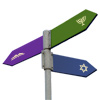|
|
 |
|
MOFET JTEC Portal Newsletter
Dear Subscriber,
We are happy to send you the latest issue of The MOFET JTEC Portal resource listing.
The current bulletin contains information items on coaching and mentoring new teachers, building online courses, teaching Hebrew and Israel, adult Jewish education, conference and study opportunities and much more.
We are proud to host an article by Lior Krinsky introducing Jerusalem U.’s Media Lab, a wonderful new Israel education resource.
We have just opened registration for MOFET International’s third online seminar on Teaching Hebrew as an Additional Language. The seminar is comprised of four sessions, led by our master teachers, to be held during January, 2018. Sign up all your Hebrew language teaching staff now!
May the upcoming days of Chanuka bring much light to you and yours,
Reuven Werber
The MOFET JTEC Portal Team
|
|
|
|
|
Please note: a complete list of recent additions to the portal follows the Featured Items.
|
|
|
 Book Review: Cultures and Contexts of Jewish Education. Authors: Barry Chazan, Robert Chazan, Benjamin Jacobs Book Review: Cultures and Contexts of Jewish Education. Authors: Barry Chazan, Robert Chazan, Benjamin Jacobs
Behind a dry title, the slim Cultures and Contexts of Jewish Education offers the reader an excellent concise review of Jewish history from the Bible to the present. The authors draw on their respective areas of expertise to situate Jewish educational models over time within broader patterns of Jewish society and close with a surprising indictment of 20th century American Jewish education along with an optimistic educational proposal for the uncertain Jewish future of those “most engaged with modernity and its challenges” (p. xxii).
|
 Assisting Struggling Teachers Effectively Assisting Struggling Teachers Effectively
In this research, we examine strategies school principals have used to assist struggling teachers. In an open-ended questionnaire designed for this study, we asked 219 school principals to describe a successful intervention they held. The results show that principals prefer supportive assistance to organizational changes (such as moving the teacher to another class). They rarely used confrontational approaches.
|
 “From the Intuitive to the Intentional”: Designing a Constructivist Online Course “From the Intuitive to the Intentional”: Designing a Constructivist Online Course
Online programs are becoming more ubiquitous in higher education; however, there has been a lack of research on the merit of this style of educating. Using the concept of constructivism as a framework, the idea that individuals construct their own understanding of world experiences, the authors generated a case study to explore the efficacy of teaching “havruta study,” text analysis in student pairs with instructor facilitation, in an online format. Findings suggest that, through careful consideration of communication styles and student needs, highly interactive in-house courses can be adapted to online settings.
|
 MediaLab: Digital Resources for Authentic Israel Education MediaLab: Digital Resources for Authentic Israel Education
At Jerusalem U, we believe in meeting teens where they are. Our team, and our approach, is unique. We are filmmakers, storytellers, and educators. We engage, educate and empower young Jews to find themselves in the story of Judaism, the Jewish people, and Israel. We seek to transform the Israel education landscape through the power of film, bringing our audience on a journey infused with authenticity, where they wrestle with deep questions, exploring Israel and their own understandings of it.
|
 Survey Highlights Staggering Price of Jewish Education Survey Highlights Staggering Price of Jewish Education
Nishma, a one-year-old sociological and market research firm, published a new study titled “The Nishma Profile of American Modern Orthodox Jews.” While the survey attempts to present an objective view of the Modern Orthodox community’s thoughts on religious life, the results provide instructive, and perhaps unintended, information about the respondents’ financial, rather than social or religious, concerns. Some observers have sought to focus on the answers it gives to potentially divisive questions about women in Orthodoxy, referring specifically to the “schism” about women serving as rabbis. However, the starker results of the survey reach a conclusion that, by far, unites all factions of the Modern Orthodox community. That concern is, in fact, how to support children and pay tuition for them to attend Jewish schools, how to keep kosher in a world with increasingly rising costs, and how to survive in increasingly expensive neighborhoods.
|
|
|

